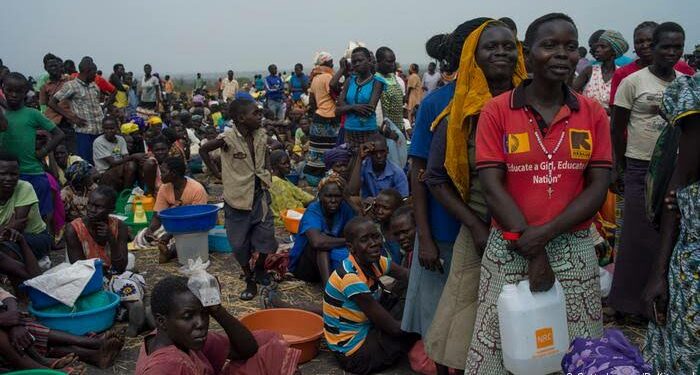Germany has pledged EUR 1 million to the United Nations World Food Programme (WFP) to aid in the nutrition and self-reliance of refugees in Uganda, supporting over 254,000 refugees and asylum seekers. This generous contribution, made through the Federal Foreign Office, seeks to alleviate both immediate food security needs and foster long-term solutions for refugees, including self-sufficiency initiatives like farming.
The influx of refugees in Uganda has increased significantly in recent years, creating substantial strain on the country’s already limited humanitarian resources. The number of refugees hosted by Uganda has surged from 600,000 in 2014 to a staggering 1.7 million today, making the country one of the largest refugee hosts in Africa.
“Refugee numbers in Uganda have nearly tripled over the past decade, straining scarce humanitarian resources,” said Abdirahman Meygag, WFP’s Country Director in Uganda.
“This funding will help WFP address the immediate needs of new arrivals and promote sustainable livelihoods for those living through protracted crises.”
This new financial commitment from Germany will directly benefit the most vulnerable refugees and asylum seekers, particularly those who have recently arrived. For the first three months, new refugees will receive a full food ration to meet their immediate needs. Meanwhile, refugees classified as moderately vulnerable will receive 30% of the full ration, while the most vulnerable will receive 60%. This support is crucial as Uganda has witnessed around 135,000 new refugee arrivals just this year alone, mainly due to ongoing conflicts and climate-related disasters in neighboring countries such as the Democratic Republic of the Congo (DRC), South Sudan, and Sudan.
In addition to addressing immediate needs, the EUR 1 million funding will also support long-term initiatives aimed at promoting self-reliance. WFP is working to empower refugees to transition from aid dependency to self-sufficiency through activities like farming and livelihood strengthening. In total, 52,000 refugees and Ugandan nationals will benefit from these livelihood programs, which are designed to improve food security and create income-generating opportunities.
The WFP’s comprehensive approach seeks to provide a pathway out of poverty for refugees, helping them establish sustainable livelihoods while easing the pressure on Uganda’s resources. Refugees engaged in self-reliance programs will receive support in the form of tools, seeds, and training to help them develop agricultural skills, which can be applied both to support their families and contribute to the local economy.
Uganda’s growing refugee population is a direct result of violent conflicts, political instability, and climate shocks that have affected neighboring countries. Refugees from South Sudan, the DRC, and Sudan have fled ongoing conflicts and environmental disasters, seeking safety and security in Uganda. However, the continuous arrival of refugees places immense pressure on Uganda’s social infrastructure, as well as humanitarian assistance programs.
The United Nations Refugee Agency (UNHCR) continues to monitor the situation closely, estimating that approximately 135,000 refugees have crossed into Uganda since the beginning of 2024 alone. These new arrivals exacerbate the already strained food systems and shelter capacities, necessitating increased international support.
As the world’s largest humanitarian organization, WFP has been at the forefront of providing food assistance to refugees in Uganda, offering both in-kind food aid and cash-based support to help refugees purchase local foods. Currently, WFP is supporting 1.4 million refugees in Uganda, providing food assistance to vulnerable groups in the form of partial food rations.
WFP’s contribution extends beyond mere emergency aid, focusing on building resilience and fostering stability for people affected by conflict, climate change, and disasters. Through food security programs, WFP aims to create a foundation for long-term peace and prosperity, ultimately supporting refugees as they rebuild their lives and communities.
Germany’s contribution to Uganda’s refugee crisis underscores its commitment to global humanitarian assistance, especially in Africa. The German government has consistently supported refugees through various channels, including bilateral aid and contributions to multilateral agencies like the WFP. With this latest donation, Germany is helping to ensure that refugees not only survive but are given the opportunity to thrive and become self-sufficient.
Do you have a story in your community or an opinion to share with us: Email us at editorial@watchdoguganda.com










